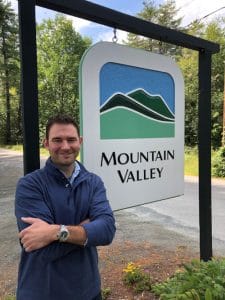Adventure programs: Learning to confront and overcome fears
The benefits of engaging in outdoor activities have been well documented. The American Academy of Pediatrics (AAP) suggests that play in an outdoor environment enables children “…to explore both their world and their own minds.” AAP adds that outdoor activity can enhance “…creativity, curiosity and associated developmental advances.”
Some residential schools are embracing this message and offer a variety of adventure and wilderness programs for children with behavioral issues.
The residential program at Mountain Valley Treatment Center in Plainfield, New Hampshire, accepts children with a variety of diagnoses, from anxiety, obsessive-compulsive disorder (OCD) and depression to autism, eating disorders, and executive functioning difficulties, according to Timothy DiGiacomo, Psy.D, clinical director.
DiGiacomo pointed out that his is not a wilderness program per se, but rather incorporates outdoor and adventure activities into therapy. “We create opportunities for residents to practice what they are learning in therapy,” he said.
DiGiacomo explained that the therapy program uses empirically based treatment – primarily CBT – and teaches residents how to apply this technique in a meaningful way.
In some cases, therapists also use Exposure Response Prevention (ERP), which helps to identify anxiety triggers and teaches students how to confront fears through exposure and experience. DiGiacomo added that exposure work can be applied to a number of diagnostic difficulties.
Students deliberately engage in an activity, such as hiking, caving or climbing a rock wall, knowing they must directly face their fears. For instance, a student leading a hiking group may experience intrusive thoughts: Am I walking too slowly? Will I take a wrong turn? Will the others hate me?
DiGiacomo explained that having these thoughts and confronting them could help bring about change for some residents.
Mountain Valley has rolling admissions, which can be beneficial for newcomers. Students who have been at the school for a month or more have learned “…the ups and downs of treatment.” DiGiacomo said, “A person will often be more likely to give something new a try if they are supported. Support and advice are different coming from a peer, someone else in the program with anxiety or OCD.”
Mountain Valley offers students several types of activities that are geared toward different capabilities. Following an activity, the resident meets with a therapist to discuss the experience. Staff monitors the daily therapy modules to ensure that residents are engaged and derive some benefit from the activities.
During the first few days of their stay, residents are screened for trauma and are asked to self-assess their anxiety levels. “Sometimes, the resident has less insight into what anxiety is or how OCD is affecting them,” DiGiacomo said. “They go through therapy and settle in and receive a lot of psychoeducation that can help them better articulate what they are experiencing.”
In January 2015, Mount Prospect Academy launched the Adventure Based Trauma Informed Treatment program in the White Mountain National Forest in Warren, New Hampshire.
According to Executive Director Richard Phelps, MSW, LICSW, the program is not just about being outdoors, but focuses on skills development. “It’s about taking positive risks and working together to problem solve,” he said. “One of the main focal points is positive productive energy release.”
Phelps reported that most of the children in the program are placed by court order and have experienced some form of trauma, which he believes is tied to energy in the body. “We support healthy energy release,” he said.
Most participants in the program have grown up in an environment where abuse and/or neglect have prevailed; multiple caregivers have been the norm, Phelps added.
Furthermore, many of the teens in the program have developmental issues and severe social, cognitive, and emotional deficits. These students are not motivated and struggle with trust and hopelessness. “Once you develop a trusting, secure environment, you can get kids to engage and you start to see skill development, competence, positive self-image, and better self-esteem,” Phelps said.
The program accommodates 12 students who have access to thousands of dollars’ worth of equipment, including a high and low ropes course, acres of bike trails and other outdoor apparatus.
In addition to multiple adventure activities, the program includes an academic component. Phelps said that students attend Mount Prospect Academy where they participate in a combination of classroom work, based on learning style and needs, and hands-on experience through an internship.
According to Phelps, many of the students have not done well in a traditional setting and this program attempts to balance and support mental health and behavioral needs with adult skills. “In reality, it’s hard to focus on independent skills if the person is not emotionally stable,” he said.
Primary interventions focus on how trauma impacts the brain and body and include cognitive behavioral therapy (CBT), dialectical behavioral therapy (DBT) and Eye Movement Desensitization and Reprocessing (EMDR), Phelps said.

John Stewart, Ph.D, assistant clinical professor, department of psychiatry, Tufts School of Medicine, consultant for public schools and private therapy programs
John Stewart, Ph.D, assistant clinical professor, department of psychiatry, Tufts School of Medicine, consultant for public schools and private therapy programs, spent time as a Peace Corps volunteer and understands the power of being outside and taking on challenges. “There is a healing force in being out in nature,” he said.
While adventure programs can benefit children with behavioral issues, Stewart noted that some programs that use coercive means to bring children into a program against their will. He said that, while some outdoor programs help with healing, others disregard the rights of children. Stewart recommends that parents carefully assess the methods used in the program they are considering.
Programs like Outward Bound and NOLS focus on connection, which Stewart said is critical in “…shepherding kids through adolescence.” For instance, NOLS makes a connection of community, teaching that the group counts on all members to be reliable and promotes a sense of purpose.
Stewart applauded programs that are not coercive and help children “…begin to find themselves.” He added that child buy-in and staff attitudes make a difference. When staff invites children to discover new thing about themselves, the child derives advantages from the program, he said.
To be successful, an adventure program should be attachment-informed and not fundamentally coercive, according to Stewart. It should promote healing and growth and initiate change on the inside through connection and love, he added.
Phyllis Hanlon has been a regular contributor to New England Psychologist since 1999. As an independent journalist, she has also written for a variety of traditional and alternative health magazines and business consumer and trade publications. She also serves as writer/editor for custom publications.


